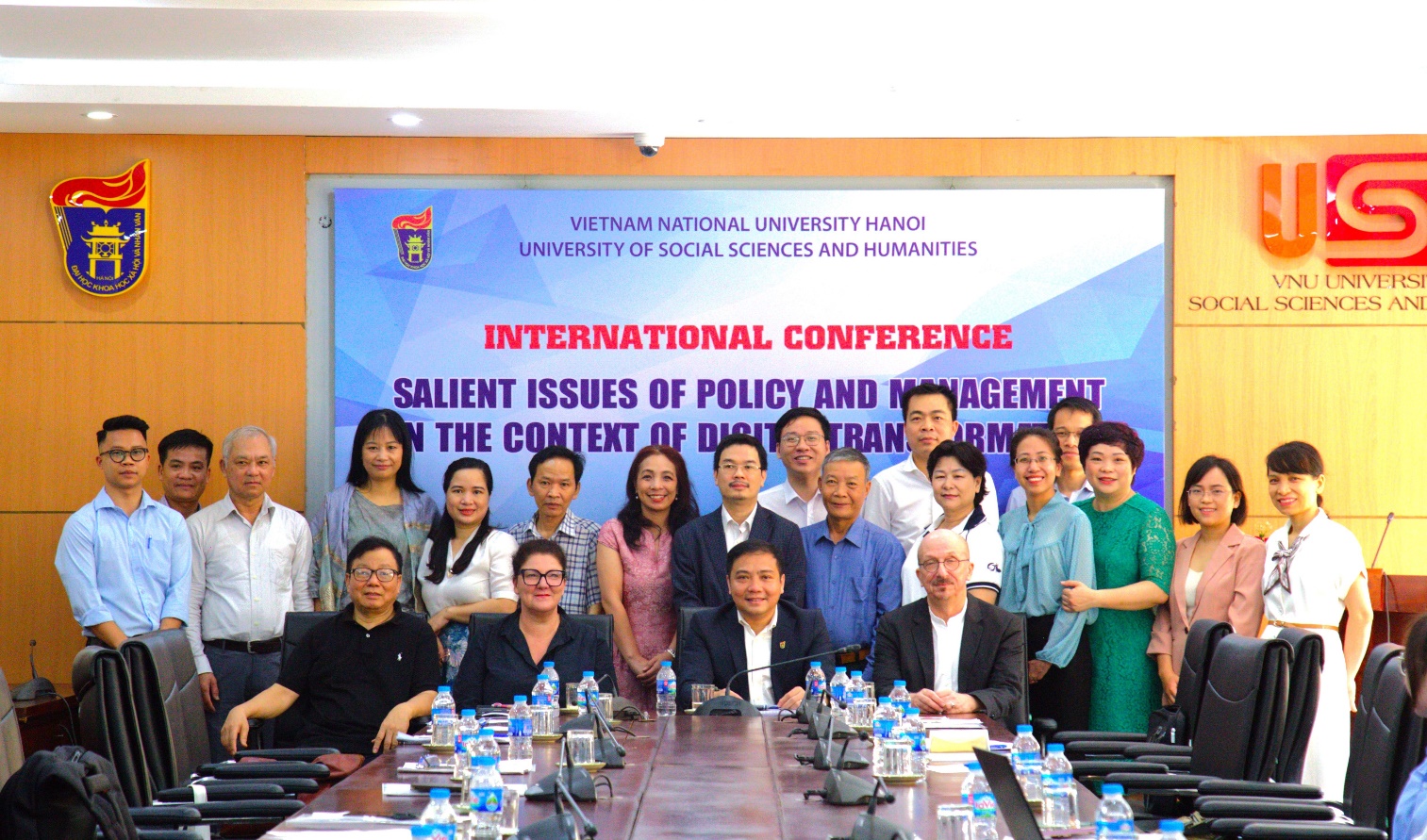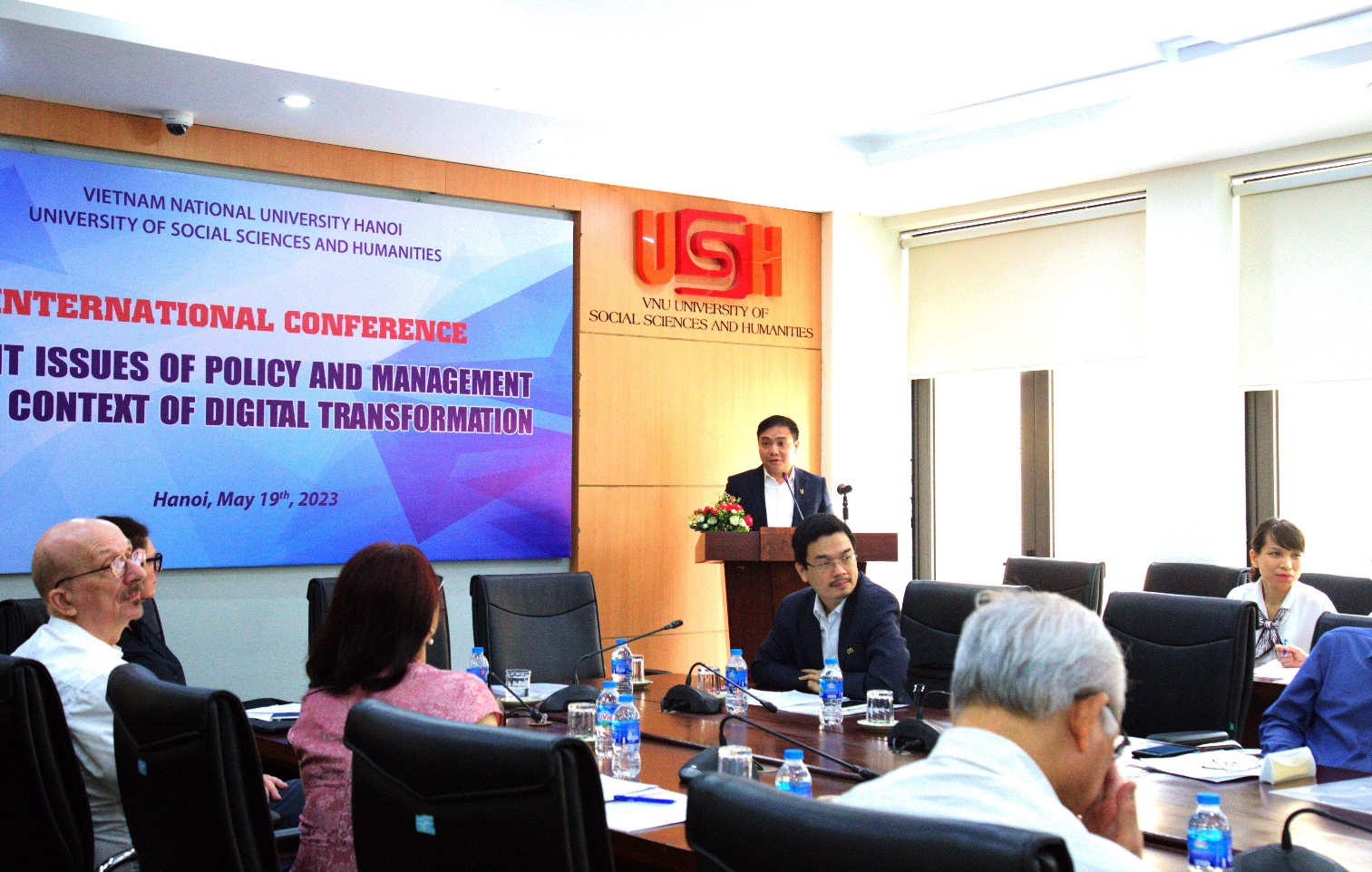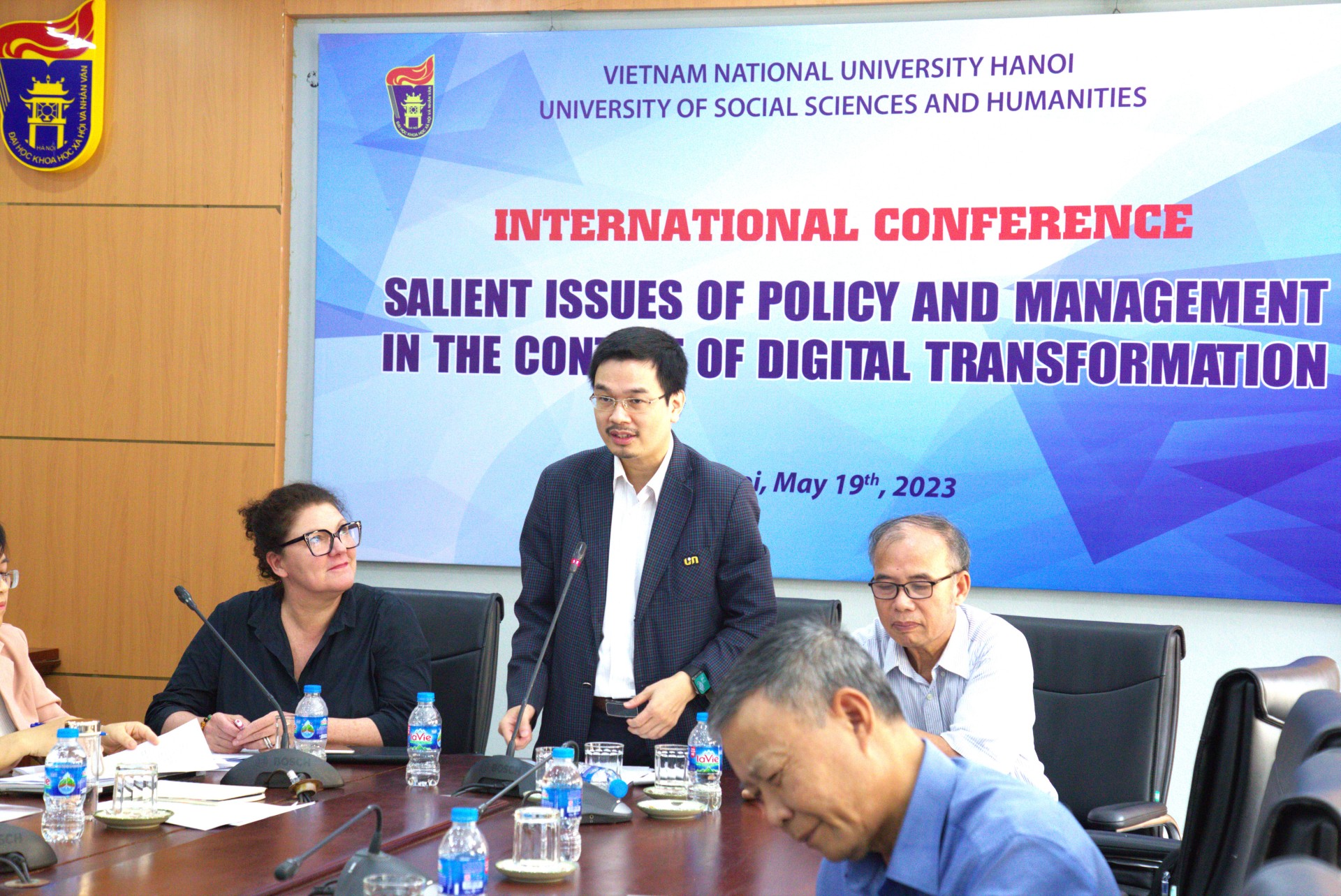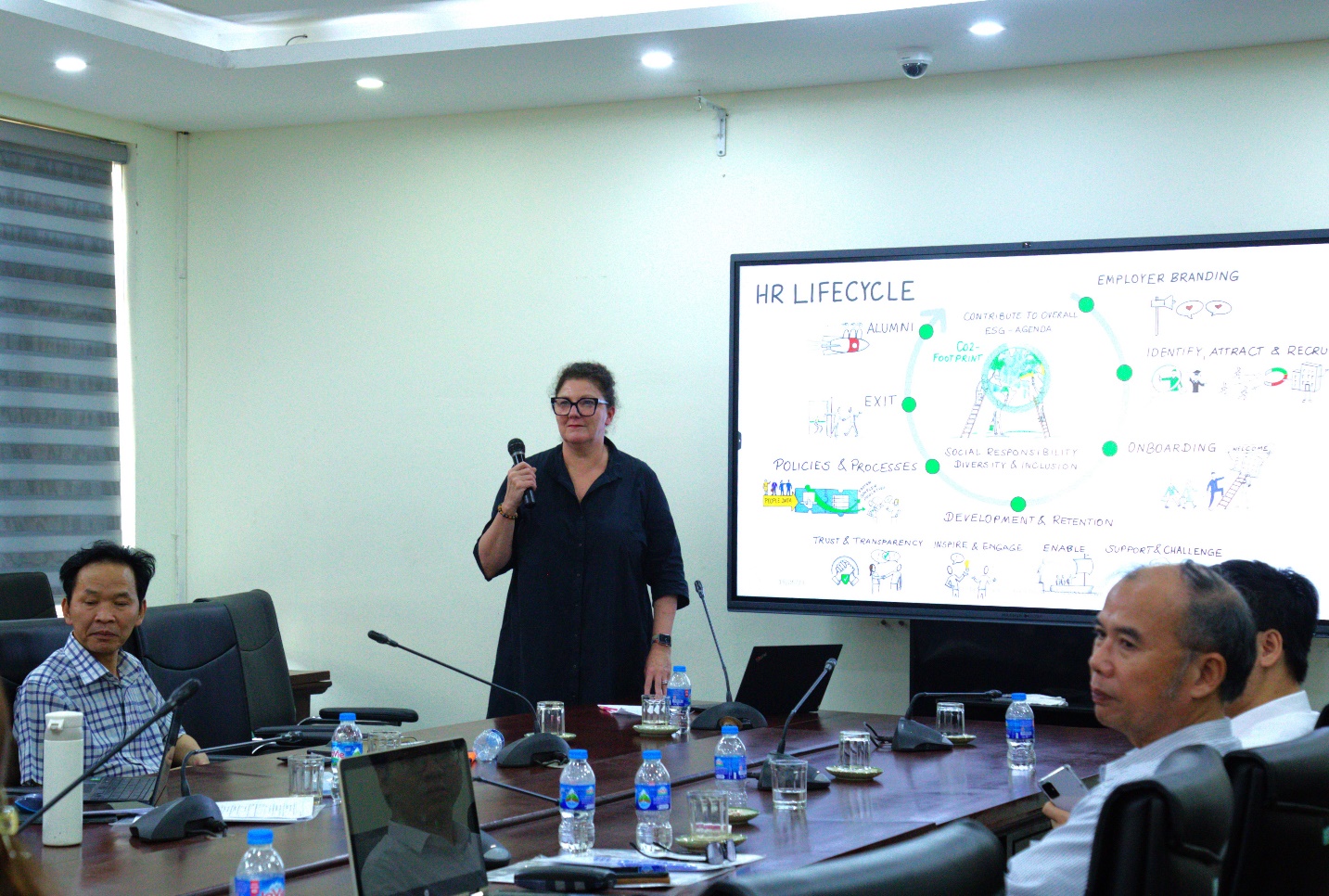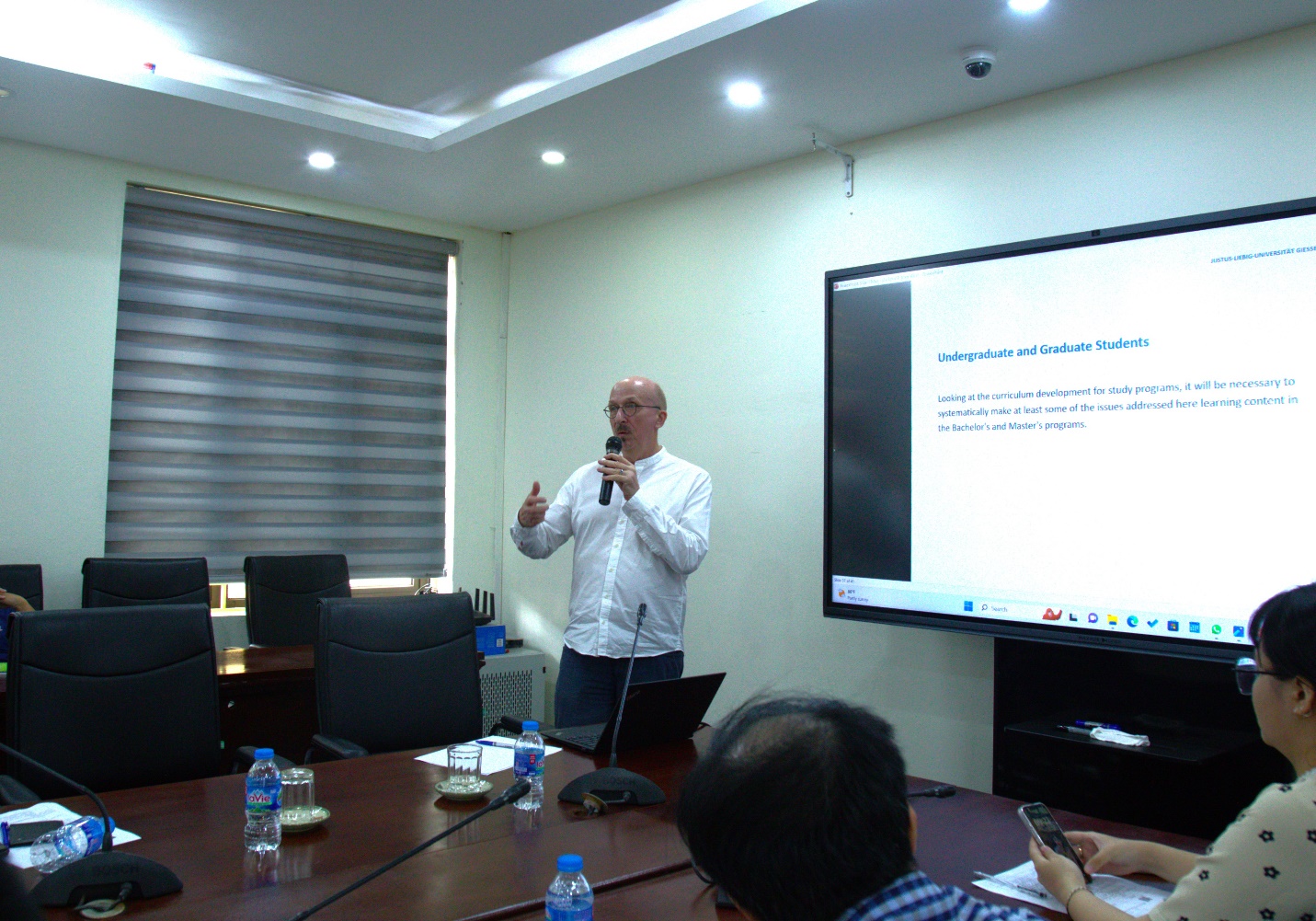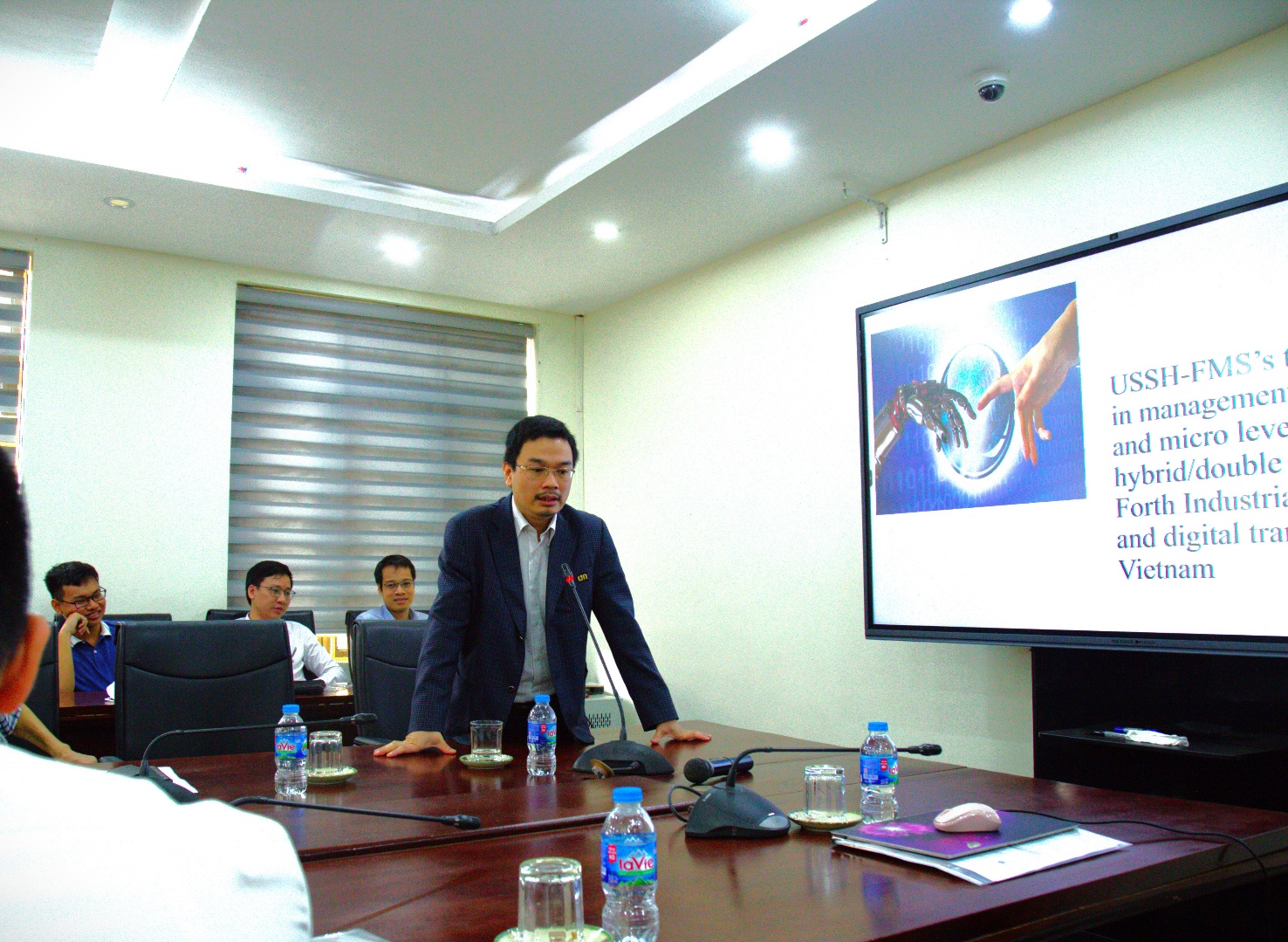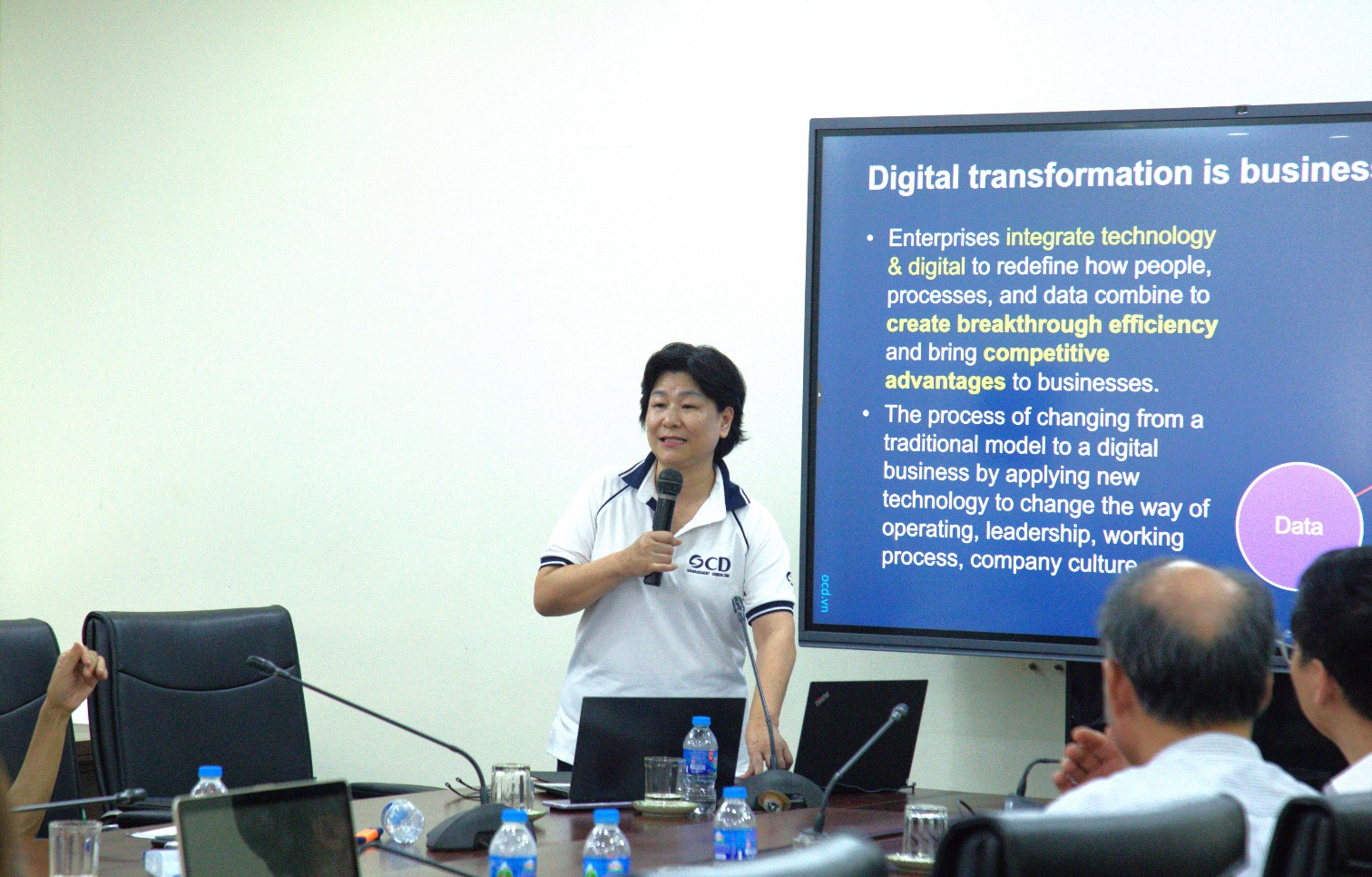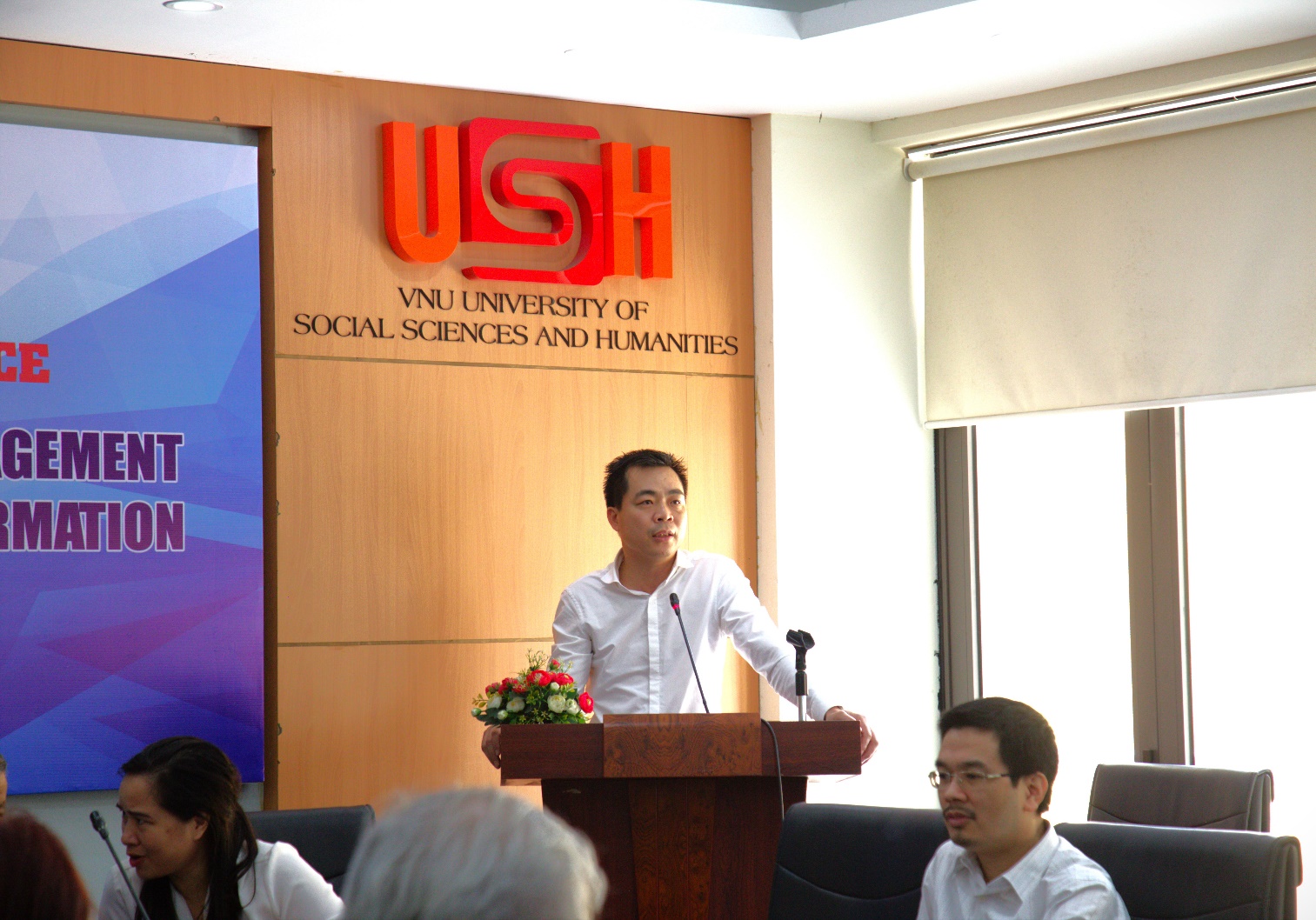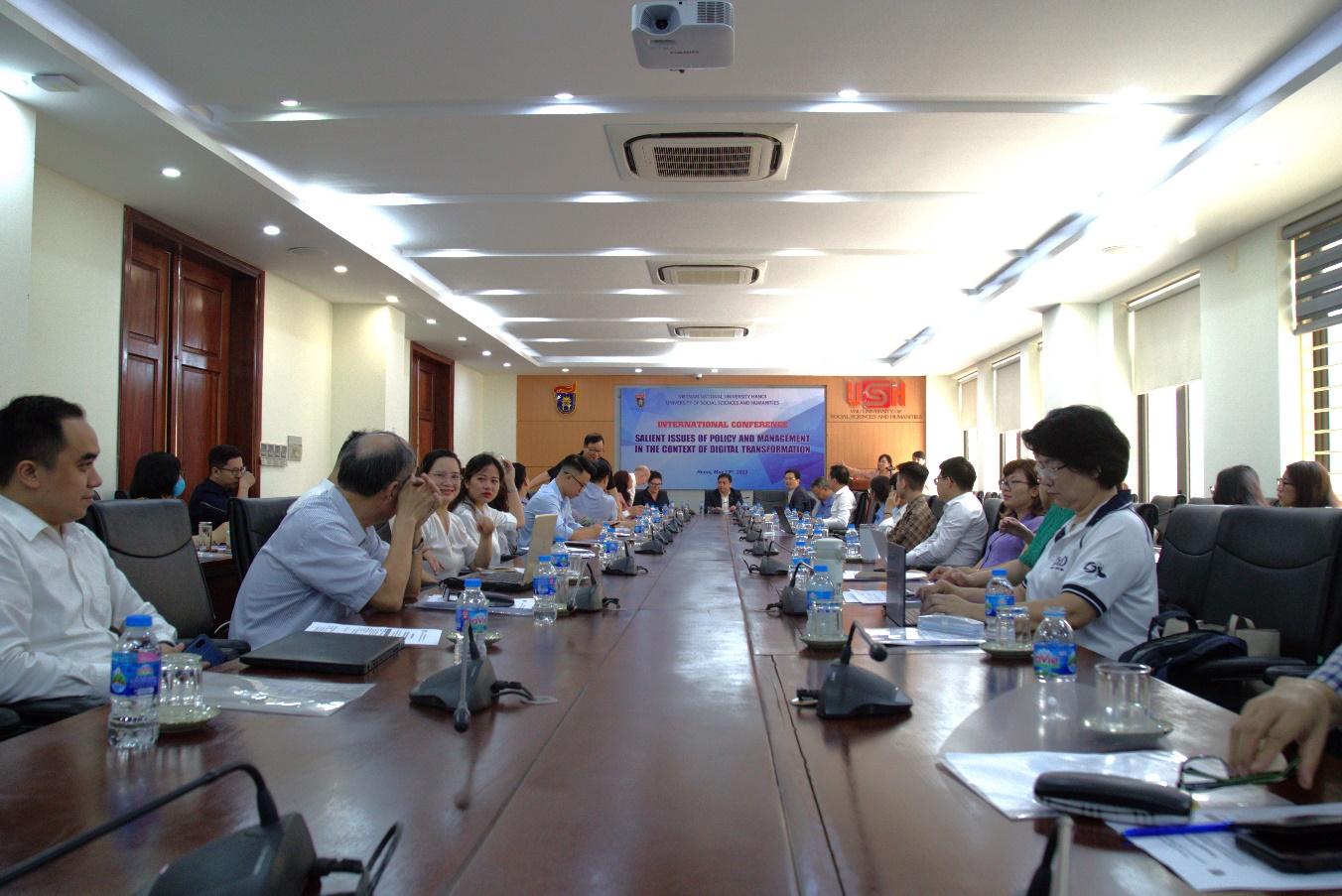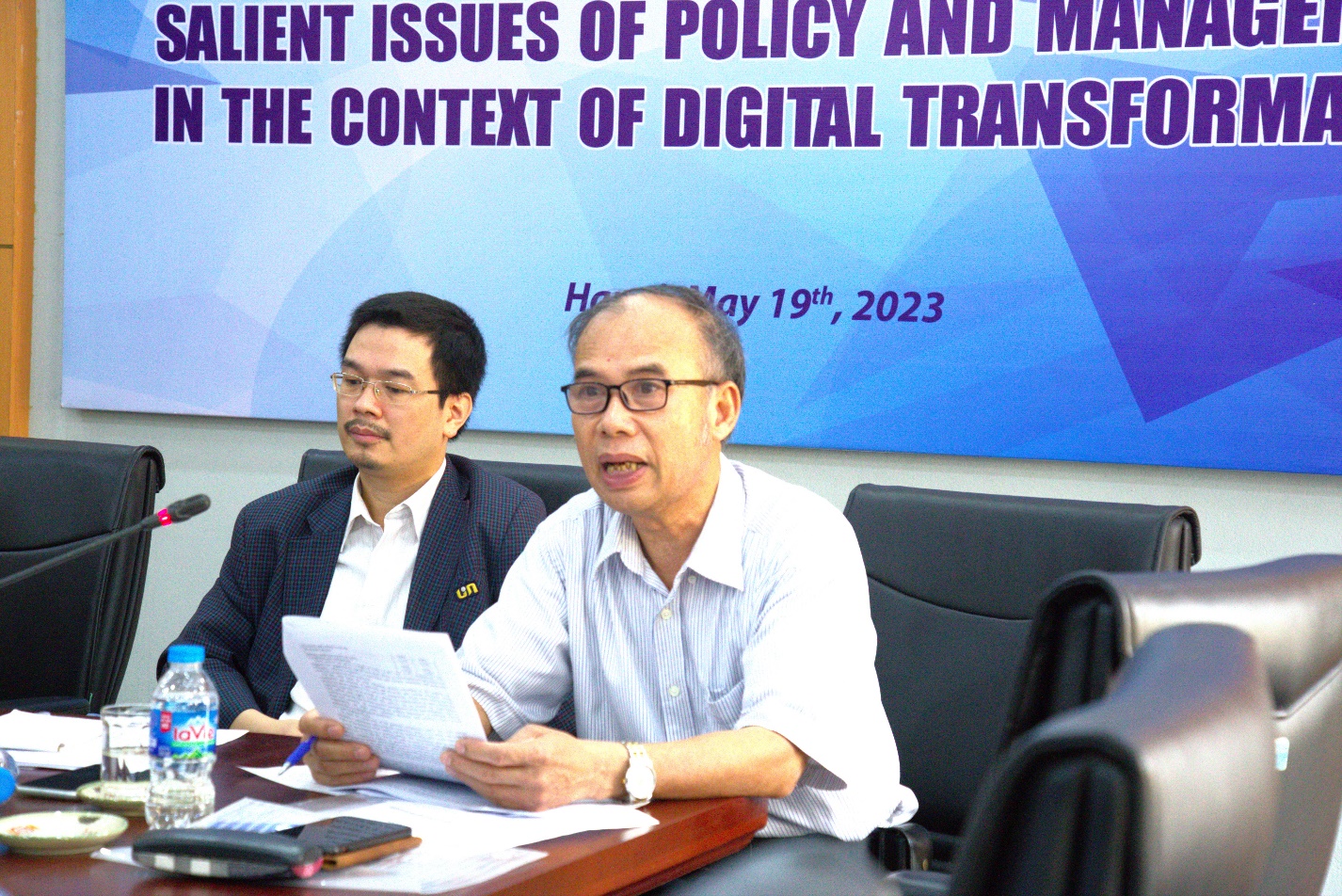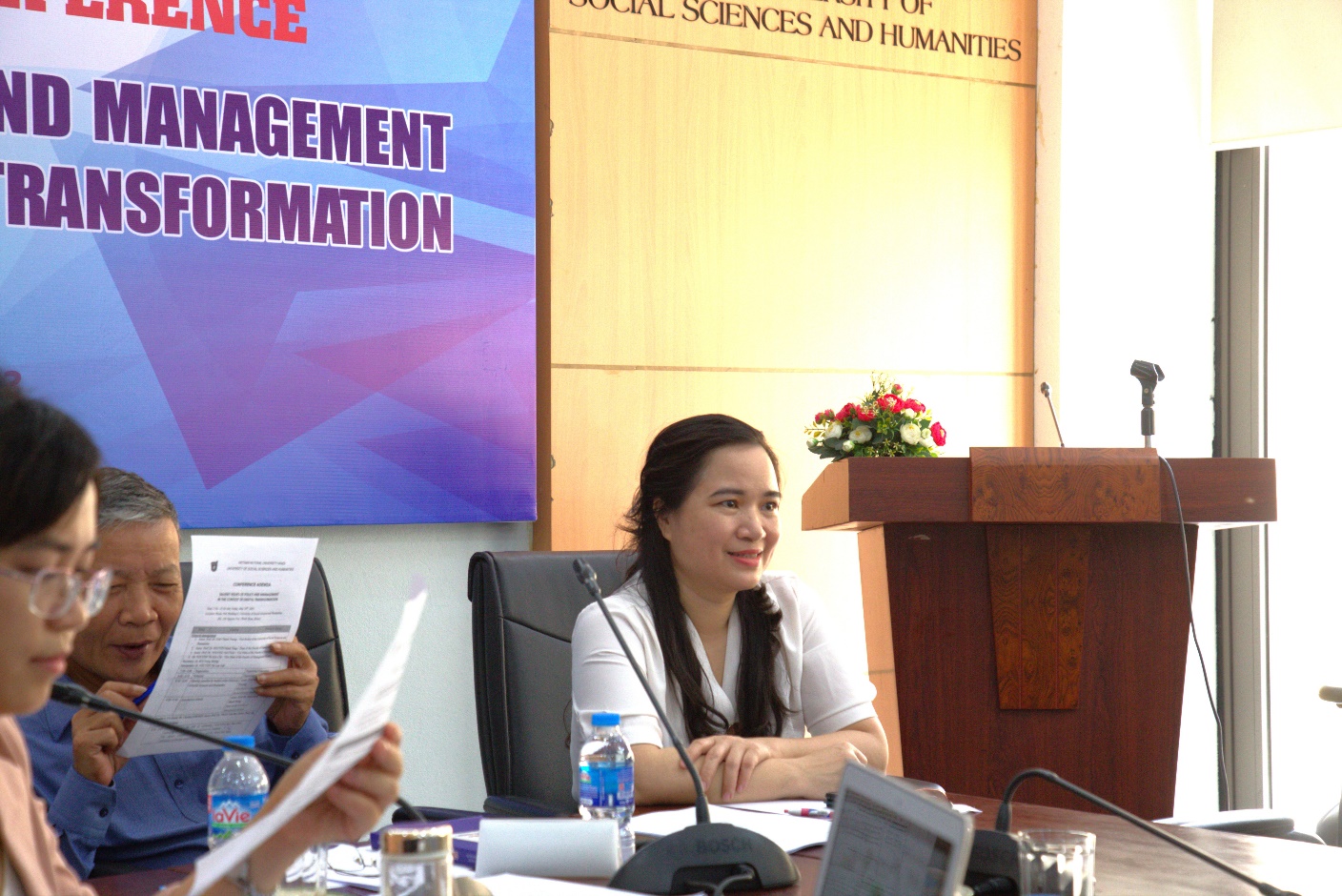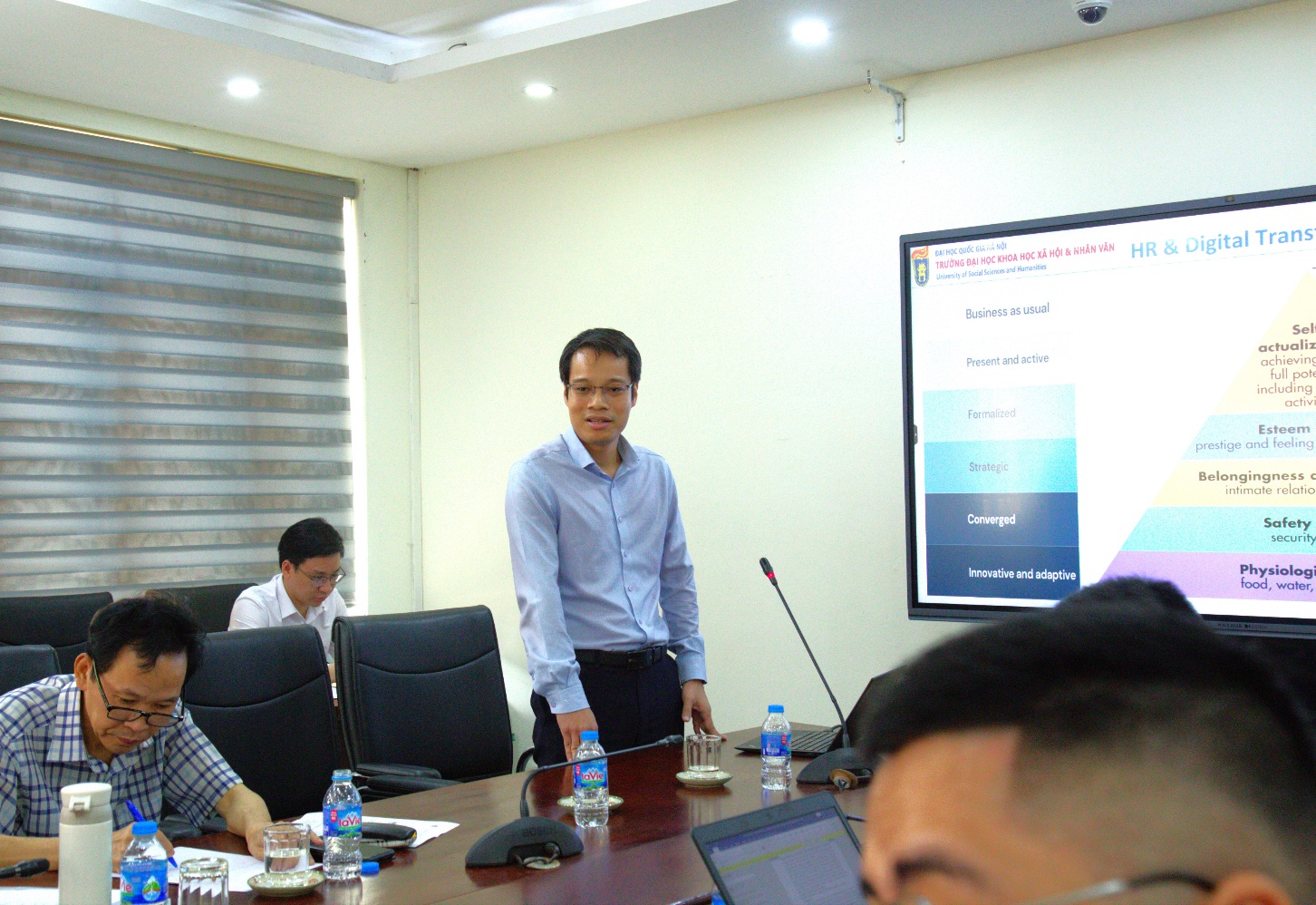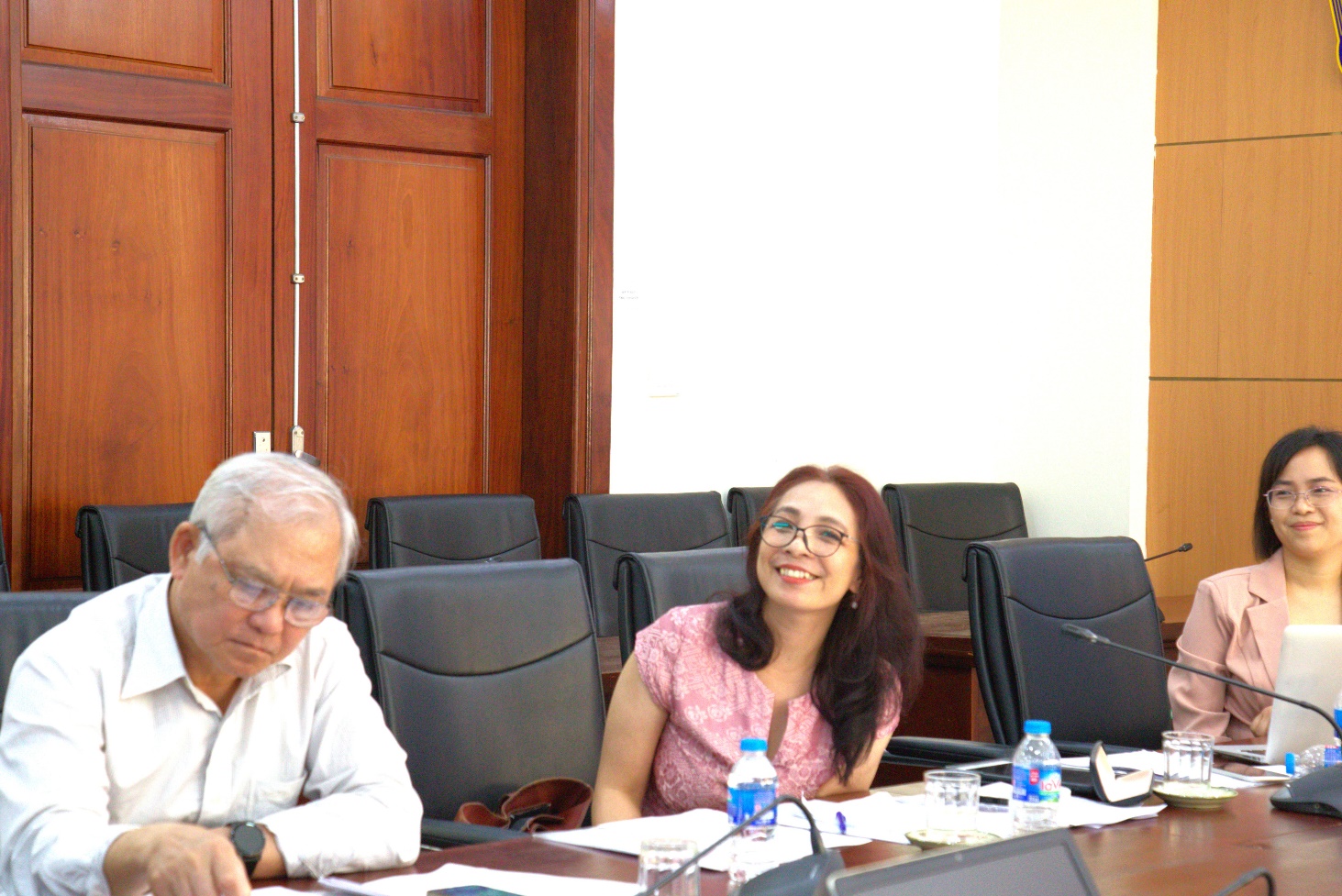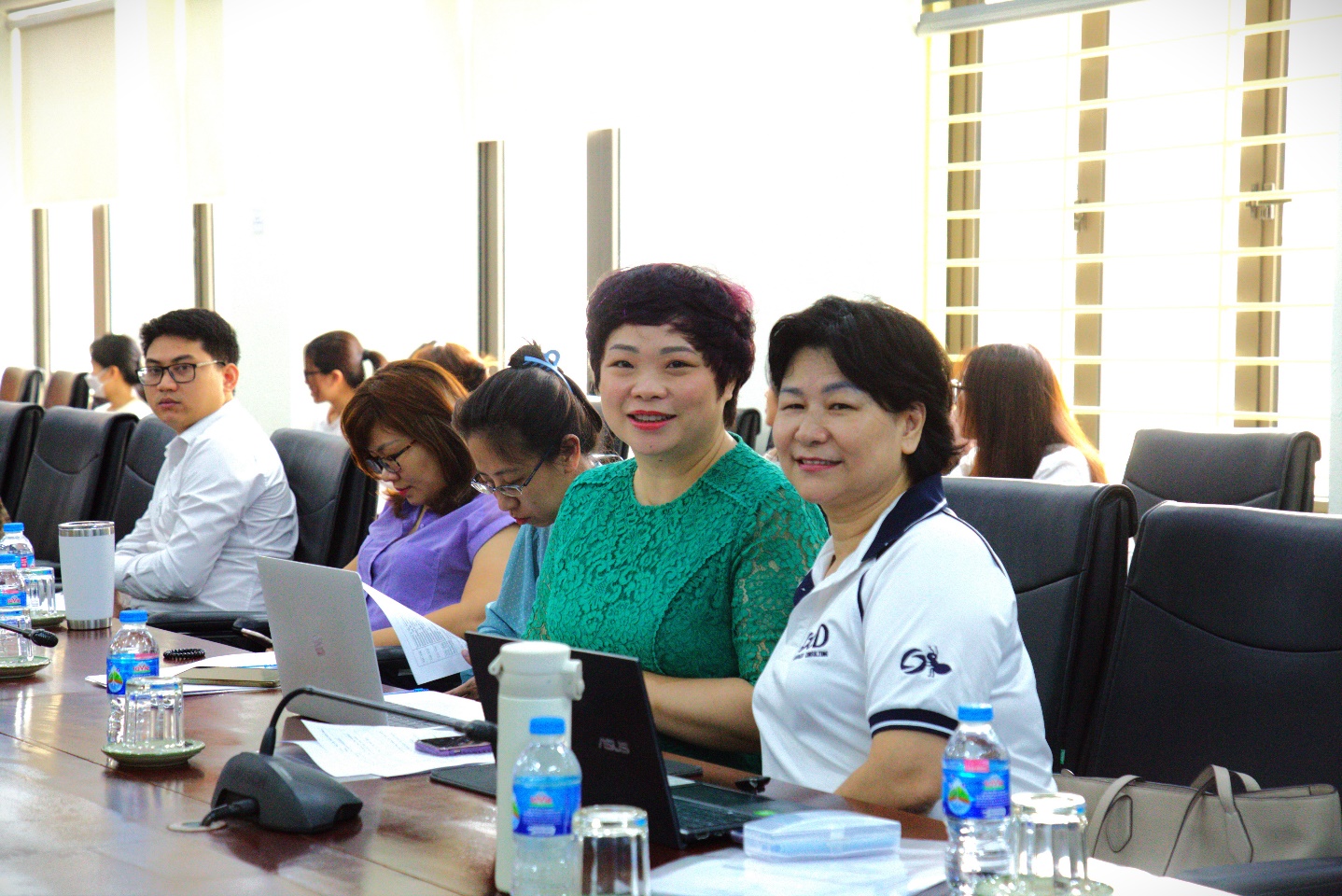On May 19, 2023, the University of Social Sciences and Humanities, Vietnam National University, Hanoi organized an international scientific conference with the theme "
Urgent policy and management issues in the context of digital transformation”. Workshop by
Faculty of Management Science, University of Social Sciences and Humanities, VNU, Hanoi chaired.
Attending the workshop, on behalf of the University of Social Sciences and Humanities, Vietnam National University, Hanoi, there were Associate Professor, Dr. Dao Thanh Truong - Vice Rector, Associate Professor, Dr. Nguyen Manh Dung - Head of the Faculty of Management Science, Associate Professor, Dr. Nguyen Van Chieu - Deputy Head of the Faculty of Management Science, Dr. Nguyen Thi Kim Chi - Deputy Head of the Faculty of Management Science, Dr. Trinh Van Dinh - Head of the Department of Scientific Research Management.
On the international guest side, there was the participation of Dr. Detlef Werner Briesen - Justus Liebig University - Federal Republic of Germany; Dr. Christa Stienen - Vice President of the Economic Consulting Organization (Denkfabrik Union der Wirtschaft).
The workshop attracted the presence of more than 40 scientists, researchers, lecturers and students from universities, research institutes and management agencies in Vietnam.
Assoc. Prof. Dr. Dao Thanh Truong - Vice Rector of the University of Social Sciences and Humanities, VNU highly appreciated the scientific and practical value of the papers presented at the Conference.
Associate Professor, Dr. Nguyen Manh Dung - Head of Faculty of Management Science, University of Social Sciences and Humanities, VNU Speaking at the opening of the Workshop, Associate Professor, Dr. Dao Thanh Truong - Vice President of the University of Social Sciences and Humanities, VNU highly appreciated the scientific and practical values that scientists and experts sent to the Workshop.
Seminar "
Urgent policy and management issues in the context of digital transformation”is a place where domestic and international researchers share the latest research results on policy and management in the context of digital transformation, pointing out common problems that exist or will appear in the future, posing the requirement to provide analysis, forecast and build policy frameworks, and manage those problems. The conference will also be an opportunity to create research networks and opportunities for research cooperation.
During the 6 months of implementation, the Organizing Committee of the workshop received 40 valuable papers on policies and management such as: digital society, social management, digital social development management, digital government, media management, training and human resource training policies, human development in the context of digital transformation. With the enthusiastic criticism of scientists, the workshop is a useful scientific forum, a premise for topics to be edited, completed and published in prestigious international journals.
The workshop was attended by Dr. Detlef Werner Briesen - Justus Liebig University - Federal Republic of Germany; Dr. Christa Stienen - Vice President of the Economic Advisory Organization (Denkfabrik Union der Wirtschaft)
Eight Contemporary Management Issues in the Context of Digital TransformationAt the workshop, experts and scientists focused on discussing current issues of concern such as contemporary issues of management in the context of digital transformation, development models and experiences of digital transformation, policy scenarios adapting to digital transformation, human resource management and development towards digital transformation, and human resource development for digital transformation in Vietnam.
In particular, experts discussed and proposed effective solutions for 8 urgent issues in Vietnam's current digital transformation. According to Associate Professor, Dr. Nguyen Manh Dung - Head of the Faculty of Management Science, University of Social Sciences and Humanities, VNU, emphasized 3 breakthrough issues that the government is interested in, which are the issue of institution building, building digital infrastructure, innovation in human resource management. In addition, the story of breakthroughs in technology market development; challenges in changing the mindset and thinking of leaders about digital capacity development were also raised by experts and scientists at the workshop.
Associate Professor, Dr. Nguyen Manh Dung - Head of the Faculty of Management Science, University of Social Sciences and Humanities, VNU, raised 8 contemporary issues on management in the context of digital transformation.
One of the eight issues that scientists mentioned is the need to prepare the conditions for digital transformation early so as not to “shock” society and have the least impact on the disadvantaged. Accordingly, in a digital society, many jobs will gradually disappear, replaced by new jobs, changing the occupational structure of society. In addition, policymakers need to pay attention to strengthening users’ trust in cybersecurity and digital security in the context of many non-traditional security issues.
In the field of education, Associate Professor Dr. Nguyen Manh Dung said that schools need to change their training philosophy, especially high-quality training. Instead of training with existing resources of schools, training on issues that society requires, the leading role of education in developing digital capacity of human resources.
Digital transformation in human resource management in Vietnamese enterprisesOne of the issues that scientists and attendees are interested in is digital transformation in human resource management in Vietnamese enterprises.
Speaker Nguyen Thi Nam Phuong - Deputy General Director - Chief Consultant
OCD Management Consulting Companysharing, human resource management has changed dramatically over the past 20 years, from an administrative and support function (HR1.0) to a strategic activity, providing resources to effectively realize business goals through the application of digital technology platforms (HR4.0). Although still performing human resource management and development activities in organizations and enterprises, human resource management today is not limited to 11 traditional business areas such as recruitment, training and human resource development, performance evaluation, compensation, etc., but has taken on the role of an internal service provider, connecting multi-disciplinary activities with digital technology and creating excellent employee experiences and optimal human resource utilization.
Speaker Nguyen Thi Nam Phuong - Deputy General Director - Chief Consultant of OCD Management Consulting Company shares solutions on digital transformation in human resource management in Vietnamese enterprises.
The basic challenges that human resource managers face in the current digital transformation context mentioned by speaker Nguyen Thi Nam Phuong include the sharing economy and gig economy operating models that create a freelance workforce that requires completely different work management and compensation methods; the 4.0 industrial revolution requires businesses to apply technology to create a better customer experience, optimize operating costs and create a faster growth rate for sustainable competition. The speaker also said that a large part of the workforce is Generation Z, they love technology and consider job changes as a part of life. Their working environment needs to be smarter and more efficient.
At the workshop, Ms. Nguyen Thi Nam Phuong emphasized that the human resource management industry is becoming more creative and innovative thanks to solutions that apply extremely smart technology, such as the use of a variety of technology platforms and smart applications to carry out human resource management and development activities. Managers need to pay attention to building policies and a friendly and effective working environment for a multi-generational workforce. This environment always makes optimal use of digital means to create a positive experience in performing work, interacting with colleagues and customers, making decisions and automating the implementation of those decisions. The speaker also suggested the need to strengthen the capacity of the human resource management department, both in terms of professional expertise and digital skills, to perform the role more effectively and intelligently, providing suitable human resources to strengthen the competitive advantage of the enterprise.
Promoting information poverty reduction in Vietnam through digital transformationAccording to Dr. Ta Thi Bich Ngoc - Faculty of Management Science, University of Social Sciences and Humanities, VNU, the current indicators for assessing poor households are multidimensional, including criteria on people's ability to access information. Accordingly, the Government has issued Decree No. 07/2021/ND-CP stipulating multidimensional poverty standards for the period 2021 - 2025, in which the indicators measure the level of deprivation of basic social services (12 indicators), including: employment; dependents in the household; nutrition; health insurance; education level of adults; school attendance of children; housing quality; average housing area per capita; domestic water source; hygienic toilets; use of telecommunications services; means of accessing information.
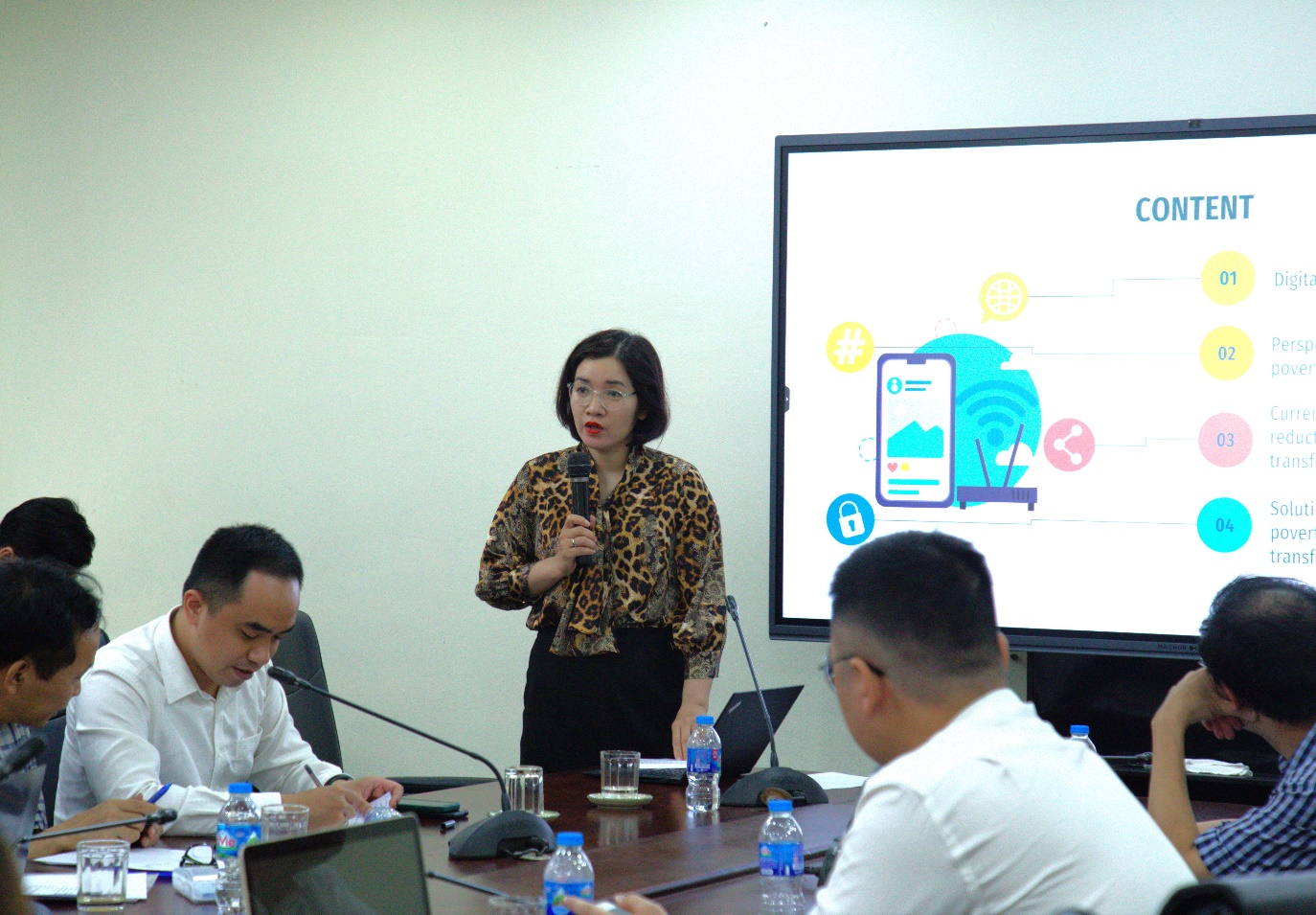
Dr. Ta Thi Bich Ngoc - Faculty of Management Science, University of Social Sciences and Humanities, VNU shared many effective solutions in promoting information poverty reduction in Vietnam through digital transformation.
Information poverty reduction is a set of activities aimed at compensating for information gaps of the poor, poor households and poor localities. According to current policies, information poverty reduction in Vietnam currently includes four basic contents: (1) Capacity building for those who carry out communication work at the grassroots level; (2) Providing facilities and platforms to provide essential information in disadvantaged areas; (3) Supporting the enhancement of essential information content in disadvantaged areas; (4) Providing public information services in disadvantaged areas and border gates.
Over the past decades, Vietnam has achieved impressive poverty reduction achievements. The multidimensional poverty rate has continuously decreased, reaching only 4.4% in 2021. In 2020, 58.2% of the population did not lack any of the 10 multidimensional poverty indicators for the period 2016-2020. Regarding the information dimension, only 2.0% of Vietnamese households lacked access to information services and 4.5% lacked means of accessing information.
However, this shortage mainly exists in ethnic minority and mountainous areas. According to the results of the socio-economic survey of 53 ethnic minorities by the General Statistics Office in 2019, only 61.3% of households use the internet, 92.5% of households use telephones, 81.5% of households have televisions, and 10.3% of households use computers. This means that ethnic minority and mountainous areas are the "lowlands" of information shortage and are the main target of information poverty reduction in Vietnam.
Poverty reduction in general and information poverty reduction in particular for ethnic minority and mountainous areas is always a big challenge for policy implementers. The main reasons come from low education level, limited production level, lack of infrastructure, frequent natural disasters and epidemics, etc.
In this context, digital transformation is a suitable and effective solution to address information poverty, towards sustainable poverty reduction. Through digital transformation activities, the region's information infrastructure will be improved, and information content to people will be fast, rich, accurate and reliable. This is an important premise to ensure security and socio-economic development.
From the overview of the current state of digital transformation of the government, businesses and people, the speaker pointed out the potential of digital transformation in promoting information poverty reduction, towards the implementation of the goal of sustainable poverty reduction in Vietnam today. The solutions emphasized by the speaker are the improvement of information poverty reduction institutions associated with digital transformation, strengthening facilities and improving the capacity of the team implementing information poverty reduction policies, and enhancing the information capacity of the poor.
Dr. Ta Bich Ngoc emphasized that digital transformation is expected to be a breakthrough solution to help poor localities shorten the process of catching up with the general development level. Particularly for information poverty reduction, digital transformation is an important premise to create a foundation to escape poverty, bring a prosperous life and a sense of happiness to the people.
Vietnam is one of the world's leading countries in internet coverage, so we can be optimistic about people's access to information through digital transformation policies and programs.
Assoc. Prof. Dr. Nguyen Van Chieu - Deputy Head of Faculty of Management Science, University of Social Sciences and Humanities summarizes and closes the Workshop
The topics discussed at the Conference will be published in book form by the University of Social Sciences and Humanities, VNU. We invite readers to follow the discussion contents in
Proceedings of the International Scientific Conference “Urgent issues of policy and management in the context of digital transformation”
Below are some photos at the International Scientific Conference "Urgent issues on policy and management in the context of digital transformation" held at the University of Social Sciences and Humanities, VNU on May 19, 2023:
